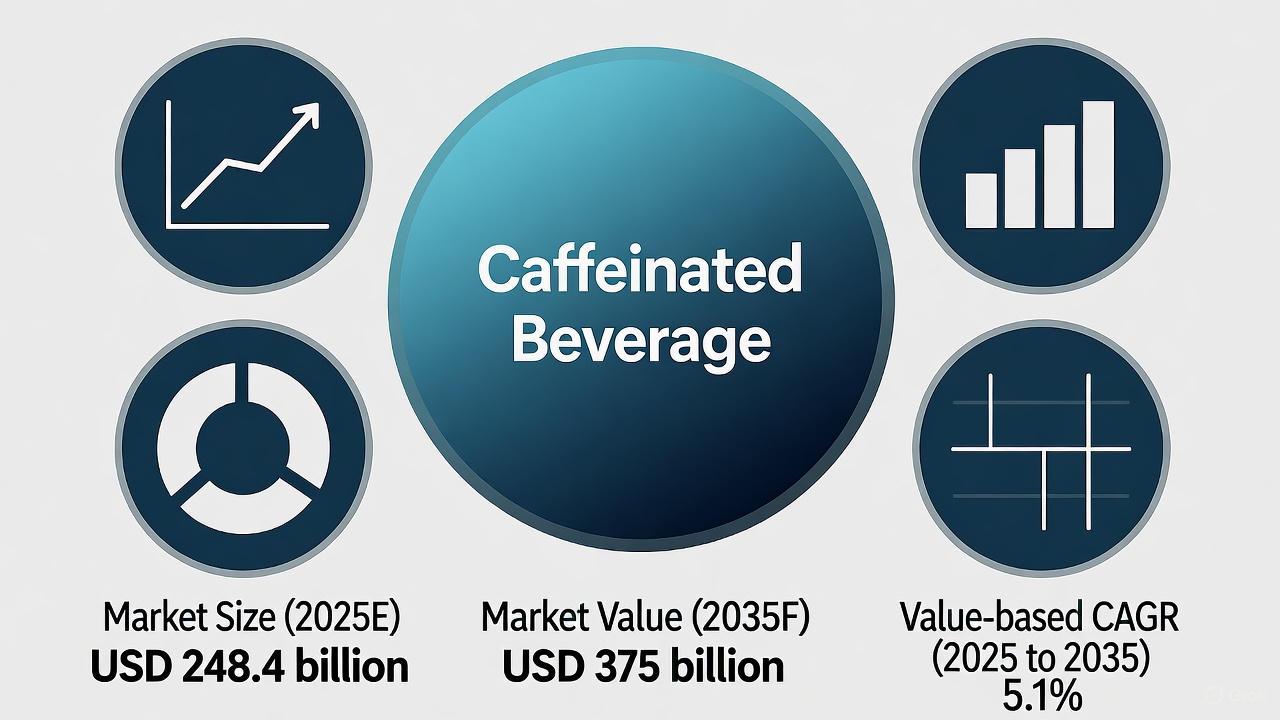Caffeinated Beverage Market to Surpass USD 375 Billion by 2035

The global Caffeinated Beverage Market is projected to reach USD 375 billion by 2035, expanding from USD 248.4 billion in 2025 at a CAGR of 5.1%. Fueled by evolving consumer preferences, innovation in product development, and the growing demand for functional and energizing drinks, the market continues to capture the attention of both established and emerging players.
Caffeinated beverages—including coffee, tea, energy drinks, and carbonated soft drinks—have become indispensable in daily routines worldwide. Consumers are drawn not only to their refreshing taste but also to their energizing properties that enhance focus, alertness, and mood. As busy lifestyles become the norm, caffeine-based beverages are emerging as a convenient and essential source of quick revitalization.
Growing Demand for Energy and Wellness-Oriented Drinks
One of the primary growth drivers of the caffeinated beverage market is the rising demand for energy-boosting solutions. As global work patterns become increasingly fast-paced, consumers are seeking beverages that deliver quick and lasting energy. Coffee, energy drinks, and caffeinated teas offer instant refreshment, helping individuals stay focused and productive.
Moreover, the growing health and wellness trend is reshaping the landscape of caffeinated beverages. Modern consumers are no longer content with just caffeine; they are demanding drinks infused with antioxidants, vitamins, and natural ingredients. Manufacturers are responding with innovative products such as organic teas, low-sugar coffees, and beverages that enhance mental alertness without compromising health.
Specialty coffee shops and organic beverage brands are also flourishing, reflecting a wider shift toward quality and wellness. Consumers increasingly view caffeine not merely as a stimulant, but as part of a broader lifestyle centered around balance, mindfulness, and wellbeing.
Innovation and Variety Driving Market Expansion
The caffeinated beverage industry thrives on continuous innovation. From the introduction of nitro coffee and cold brews to flavored and functional energy drinks, brands are racing to create products that cater to an increasingly diverse and experimental consumer base.
The surge in ready-to-drink (RTD) beverages has also revolutionized the market, offering convenience for busy consumers who seek refreshment on the go. This expanding variety sustains consumer interest and fosters brand loyalty. Innovation in packaging, sustainability, and flavor formulation further cements the market’s strong growth trajectory.
Leading manufacturers are investing heavily in research and development to create distinctive products that stand out in a crowded marketplace. The ability to blend innovation with functionality remains a key differentiator among top brands.
Challenges: Health Awareness and Regulatory Barriers
Despite its robust growth, the market faces notable challenges. Increasing health awareness has led some consumers to moderate their caffeine intake due to potential side effects such as heartburn, elevated blood pressure, or digestive discomfort. As a result, brands must strike a balance between energy enhancement and health safety by offering low-caffeine or caffeine-free alternatives.
Additionally, regulatory differences across countries regarding caffeine content, labeling, and advertising practices pose hurdles for global expansion. These variations often delay product launches and require brands to allocate additional resources for compliance. Companies navigating these regulatory landscapes must remain agile while maintaining innovation and consumer trust.
Evolving Consumer Preferences and Emerging Trends
Consumer preferences in the caffeinated beverage market are evolving toward personalized, health-driven, and sustainable options. There is a noticeable rise in demand for plant-based, organic, and ethically sourced beverages that align with the modern consumer’s value system.
Functional beverages are gaining traction, combining caffeine with additional health benefits such as enhanced focus, metabolism support, and mood regulation. Likewise, cold brew and nitro coffees are reshaping coffee culture with their smoother taste profiles and artisanal appeal.
Sustainability is another major factor influencing purchasing decisions. Brands are adopting eco-friendly packaging, carbon-neutral operations, and ethically sourced ingredients, reflecting a broader movement toward responsible consumption.
Get this Report at $3500 Only (Report price) | Exclusive Discount Inside!: https://www.futuremarketinsights.com/reports/sample/rep-gb-20406
Market Segmentation and Regional Insights
By product type, carbonated soft drinks dominate the market with a 42.7% share in 2025, owing to their refreshing flavors, portability, and mass appeal—especially among younger demographics. Synthetic flavors, holding a 69.3% share, remain popular due to their affordability and consistency, enabling producers to maintain variety at competitive prices.
Grocery stores continue to serve as the leading sales channel, offering consumers easy access to diverse brands and frequent promotional deals that boost overall consumption.
Regionally, the United States leads the market due to its dynamic coffee culture and the rise of ready-to-drink beverages. Germany and the United Kingdom are witnessing growth fueled by the popularity of specialty coffee and wellness-oriented drinks. In India, rapid urbanization and changing lifestyles have created new opportunities for both local and international brands. Meanwhile, Australia’s thriving café scene and preference for cold brews are shaping a vibrant regional market.
Key Players and Industry Strategies
The caffeinated beverage landscape is highly competitive, featuring global leaders such as Nestlé, PepsiCo, Red Bull, Rockstar, Inc., Dr Pepper Snapple Group, Monster Energy, Taisho Pharmaceutical Holdings, AriZona Beverages USA, and The Coca-Cola Company.
Nestlé continues to dominate the coffee segment through its iconic brands and innovation in instant and specialty coffees. PepsiCo leverages its powerful distribution network to maintain leadership across multiple beverage categories. Red Bull and Rockstar are recognized for their strong brand identity, targeting young, energetic consumers through sports sponsorships and lifestyle marketing.
Emerging and regional manufacturers are also making their mark by introducing new formulations, organic options, and sustainable packaging, positioning themselves as the next wave of growth drivers in the sector.
- Art
- Causes
- Crafts
- Dance
- Drinks
- Film
- Fitness
- Food
- الألعاب
- Gardening
- Health
- الرئيسية
- Literature
- Music
- Networking
- أخرى
- Party
- Religion
- Shopping
- Sports
- Theater
- Wellness


